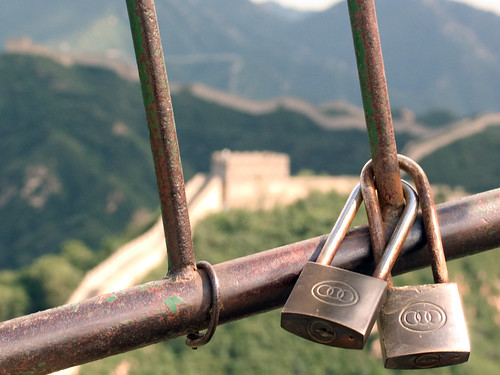This photo of intertwined padlocks on the Great Wall of China by nuck, uses one of China’s major attractions to highlight the country’s (at times) superstitious nature.

Nuck’s comment on the photo is as follows:
Young couples interlock padlocks on gates dotting the Great Wall in the belief it will bring the strength of the wall to their relationships.
I never knew that! I can’t remember seeing any padlocks on the Great Wall of China, but I guess if I had seen some, I wouldn’t have thought of them as being significant.
It just goes to show that the Chinese are quite superstitious. In cases like this, I like it! It’s both romantic and endearing. There are times when the superstitions are less appealing however (like when I can’t do something because of a superstition!).
Anyway, I liked the concept when I saw the photo, but the clincher was that it was set on the Great Wall of China, a place I’ve visited and a place of such significance for China.
I’ve seen hundreds of photos of the Great Wall, but never one like this. It was unique. Most photos are just shots of the wall stretching into the distance. To see a photo which wasn’t just a photo of the wall, but was a photo of something else which just happened to be on the wall, was truly refreshing.
Likewise, the topic wasn’t something I’d normally associate with the Great Wall. When I think of it, I’m not thinking about customs and superstitions. I’m thinking about the ancient Great Wall of China, the spectacular achievement by the Chinese of long ago (and boy isn’t it something).
I’m wondering how long is the Great Wall of China, how did they build it, why did they build it, how old is it, etc or perhaps just marvelling at the magnificent engineering feat.
The Great Wall of China is really something that’s worthwhile visiting if you get the chance. Just remember to keep an eye out for the padlocks. If you see any, let me know!

